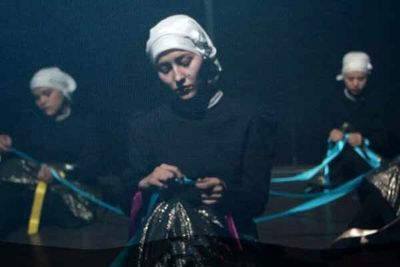Emad Rasouli, the Afghan director of the play "Forty- Girl Mountain", who has staged this play in Mehregan Theater, told Mehr News Agency about this performance: "We staged this play twice on March 28, but unfortunately the theaters were closed and the play was halted to stage. With the reopening of the theaters, we had 3 performances on April 3, 4, 5 and it was decided not to stage the play in April but due to the reception that has been shown in just a few performances of the play, we are going to take the stage again in May."
He explained the theme of the work: "This play narrates the bravery of Hazaras girls against the tyranny of Abdul Rahman Khan, one of the commanders of the time under British rule in Oruzgan. These girls resisted for 7 days and the leader of this resistance was a girl named Shirin. Finally, Shirin decides to die voluntarily and threw herself from the top of the mountain to avoid captivity and humiliation."
The theater artist said about the time of this event: "Because some people consider this event a myth and do not accept that it really happened, the exact time of this event is not known, but according to research that I did, it is about a hundred years ago when the British entered Afghanistan for colonization. Unfortunately, not much information is available about this incident, and there is a dichotomy between the Hazaras people and other ethnic groups in Afghanistan as to whether this incident is real or not, which has led to this incident not being recorded in history and being distorted. But in my research in the area, I came across graves that the people of this province believe are the graves of these girls."
Rasouli noted: "I myself am from Afghanistan and live in Iran and I am interested in folklore stories and the subjects and topics that I choose to perform or make a short film about are related to this in Afghanistan. At first, I was supposed to stage a play about Rabe'e Balkhi, but at the suggestion of my friend, I decided to work on the Hazaras girls, because this play is a feminine work and at the same time, it is bitter and sweet. Since little information is available about this incident, despite my research, I, along with Amir Hossein Alemi and Ahmad Ata’ie, who are other playwrights, enriched the story in order to make it more attractive to become a play. This may not be a true story, but such events are the reality of the women of my country every day, and there are many such incidents."
The theater director concluded by pointing out that he had been focusing on this play for the past 4 years and that he had planned to stage it two more times before, which was not possible for some reason, and stated: "This play is post-modern and at the same time, it is absurd that we are witnessing the creation of a traditional atmosphere. The play is a combination of form movements of actors and dialogue. we first see the story is narrated by one of the warlords to his wife who witnessed this event, and then we see the presence of these girls in the wife's dreams, which is accompanied by form movements."
Source: Tehran Times

